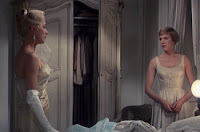Woman of the Year
For Christmas I received the TCM Greatest Classic Films Collection: Romantic Comedies DVD, which features four Katherine Hepburn movies. I found it interesting that TCM apparently believes Katherine Hepburn has some sort of monopoly on classic romantic comedies (No Doris Day??), but they're all great movies so I was pretty excited to add it to my collection. The DVD features The Philadelphia Story, Bringing Up Baby, Adam's Rib, and Woman of the Year, all films I've seen before but expect to watch many more times.
I've always really enjoyed Katherine Hepburn's movies with Spencer Tracy. They're kind of a strange couple when you think about it, but they manage to make it work, maybe because of their off screen, slightly scandalous romance. But they're mostly interesting because they almost always try to carry some sort of forties-feminist message. Not really a surprising role for Katherine Hepburn, an independent, strong, pants-wearing woman in real life.
In Woman of the Year, she plays ... woman of the year, Tess Harding, a serious journalist who runs all over the country, rubbing elbows with countless important political and world leaders. Her life is ridiculously busy and work-focused until she meets Spencer Tracy who plays Sam Craig, an average joe sports writer. He's instantly smitten with her and they begin a somewhat abnormal romance, consisting of him escorting her to her various engagements and attending her crowded parties.
The relationship is clearly strained by her crazy schedule and his obvious desire for a conservative housewife, but they marry nevertheless. It doesn't take long for things to start coming between them and just when Tess is named Woman of the Year, Sam decides to move out. She soon realizes that all her success isn't as sweet without him and she comedically attempts to be the housewife she thinks he wants.
I would love to hear a 1940s audience's take on this film. By today's standards, the only thing that seems extreme is Sam's desire for a stereotypical housewife--someone to make him dinner and wait on him when he gets home from work. But I would guess that quite the opposite was true 70 years ago.
In the end they both learn to compromise. He no longer wants just a housewife. He respects her for her work, and she learns that some of her career may need to be put on the back burner if she wants a good marriage.
This seems like a perfectly fair compromise and it's exactly why I like these films. They're sort of feminist--the woman works, she's important and well respected. But she also respects her husband enough to make some sacrifices in order to build a strong marriage. It's a message that's often lost today in a world where women are encouraged to do anything they want to, even at the expense of their marriage or family.
I'm not sure these films had a particularly grand effect on the feminist movement, but certainly Katherine Hepburn paved the way for many women and brought in a new way of thinking. They may not be exactly cutting-edge feminism, but they bring up some issues that many classic comedies gloss over. And all that mixed with some great comedy and two legendary stars make for some really fun movies.



.jpg)
















